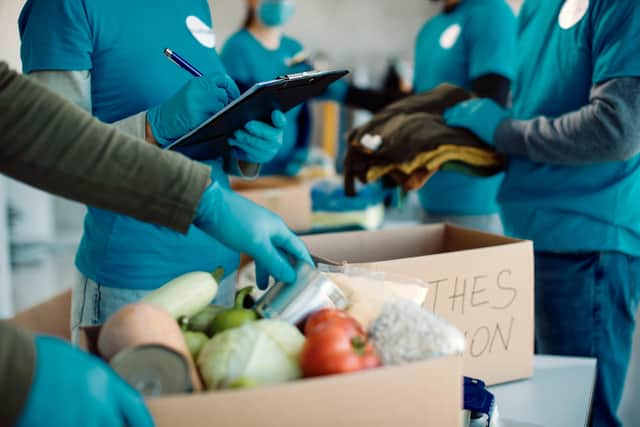Eastbourne foodbank is busiest in the South East, new data shows
and live on Freeview channel 276
The Trussell Trust (TT) data shows foodbanks have provided more than 2.1 million food parcels to people across the UK in past year (April 1 2021 – March 31 2022) – 830,000 parcels were provided for children compared to 720,000 in 2019/20.
A spokesperson for TT said it’s witnessed an ‘accelerating crisis across the UK’ as the need for emergency food has increased.
Advertisement
Hide AdAdvertisement
Hide AdThis lines up with a cut to Universal Credit and people being faced with the cost of living crisis.


Looking at the South East overall, 258,000 food parcels were given out to people in the last year according to TT – this is a rise of 29 per cent since 2019/20.
Data reveals that out of 45 locations in the South East, Eastbourne is the busiest place in the region in terms of foodbank use.
The town currently has 10 distribution centres and in 2019/20 the total number of parcels distributed was 15,117. In 2020/21 this dropped slightly to 15,087 but in 2021/22 it rose to 18,019 – 6,649 of which were given to children.
Advertisement
Hide AdAdvertisement
Hide AdThis is a 19 per cent rise when you look at rates before and after the pandemic.
Rother and Hastings were second and third in the South East ranking.
As inflation continues to increase and rising bills are putting pressure on families across the country, TT says its network expects need for emergency food to rise further still, over the coming months and beyond. One food bank manager said, “The people who come in are telling me they’re scared. People are beside themselves about what the next six months will bring.”
Emma Revie, chief executive of TT, said, “People in the South East are telling us they’re skipping meals so they can feed their children. That they are turning off essential appliances so they can afford internet access for their kids to do their homework.
Advertisement
Hide AdAdvertisement
Hide Ad“How can this be right in a society like ours? And yet foodbanks in our network tell us this is only set to get worse as their communities are pushed deeper into financial hardship. No one’s income should fall so dangerously low that they cannot afford to stay fed, warm and dry.
“There is still time for the UK government to do the right thing. We are calling on the UK government to bring benefits in line with the true cost of living. As an urgent first step benefits should be increased by at least seven per cent, keeping pace with increases in the cost of living. In the longer term, we need the government to introduce a commitment in the benefits system to ensure that everyone has enough money in their pockets to be prevented from falling into destitution.
“By failing to make benefits payments realistic for the times we face, the government now risks turning the cost of living crisis into a national emergency.”
A government spokesperson said, “We recognise the pressures on the cost of living and we are doing what we can to help, including spending £22 billion across the next financial year to support people with energy bills and cut fuel duty.
Advertisement
Hide AdAdvertisement
Hide Ad“For the hardest hit, we’re putting an average of £1,000 more per year into the pockets of working families on Universal Credit, have also boosted the minimum wage by more than £1,000 a year for full-time workers and our Household Support Fund is there to help with the cost of everyday essentials.”
Read more on the cost of living crisis:
